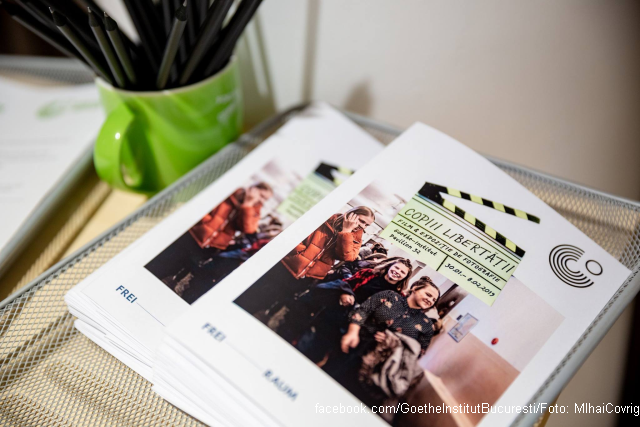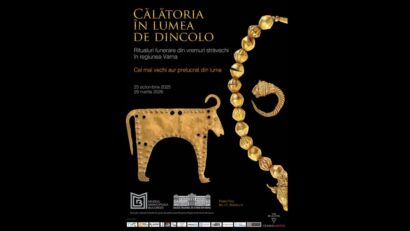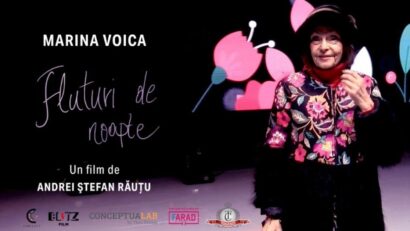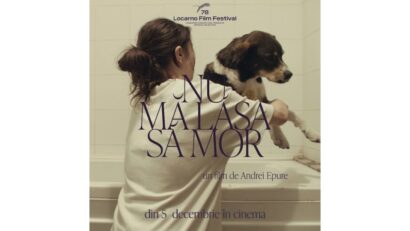Children of Freedom
Freiraum could define a certain feeling of fear of or anguish at the idea of freedom.

Monica Chiorpec, 16.02.2019, 14:26
40 Goethe institutes from across Europe have started the project Freiraum. The German word is not easy to translate but, put into context, it could define a certain feeling of fear of or anguish at the idea of freedom. It could be either fear induced by potential loss of personal freedom or it could be something related, in a collective sense, to the incapacity of benefiting from freedom, in the sense of freedom as guaranteed today by the European institutions. Therefore, the project of the Goethe Institute intends to make an X-ray of the young Europeans’ perception of freedom.
Evelin Hust, the director of the Goethe Institute in Bucharest has more: “We wanted to see how we could connect people from various countries in Europe and to think about the idea of freedom. Is freedom in danger today? Is freedom of expression threatened today, given the examples of Turkey and Poland? Is the right to choose a way of life threatened as happened in Romania with the Coalition for Family, when someone defines the idea of family? We also wondered if freedom could still manifest itself in case of economic recession. Also, there is this question: are we really free? Are the promises of the EU really translated into freedoms? I believe that the role of democracy and the benefits it can provide are regarded with more scepticism here than in the western countries.”
The Freiraum project seeking to interconnect various European capitals paired Bucharest with the Lithuanian capital Vilnius, following a drawing of lots. Ruxandra Tuchel, who made the film “Children of Freedom”, says the pairing, while random, is in fact very appropriate, as it compared the idea of freedom today with the communist period experienced by both countries: “The theme of freedom is very important. If we think about it in the current context dominated by the explosion of populism and nationalism, we can say it is becoming an increasingly serious problem. However, it’s very interesting to see, especially in Eastern Europe, how from one generation to the next, from parents to children, it appears that history cannot be understood. The children we talked to are in high school, are 17 or 18 years old, and their parents, who were young in the 1990s, immediately after the fall of the Berlin Wall, find it hard to explain to their children that the world has changed and that the freedom they enjoy today was a dream thirty years ago.”
The idea of freedom is probably reflected today, as noted by the young people interviewed for the documentary “The Freedom Children”, mainly in the ability to travel freely for study or work in other European countries. However, there are sometimes economic barriers to overcome.
Evelin Hust once again: “I think young people have much more freedom of movement and to choose where to study and live. But this only applies to the well-educated among them. In recent years, we have realised that some young people feel left behind, especially with the high unemployment rates we’ve seen after the recent financial crisis in countries like Portugal, Spain and Greece. Young people in these countries must be wondering where their freedoms are, given that they lack the economic resources to enjoy these freedoms. We cannot draw a general conclusion about these things, but I believe that sometimes young people see freedom as something normal because the younger generations have not lived through the times when, in Romania or in East Germany, people lived behind the wall and the freedom was movement was restricted.”
Behind the Iron Curtain, the life of young people was anything but easy, and trying to imitate a Western lifestyle could often have serious repercussions on their rights and freedoms in a totalitarian regime where peoples’ rights were infringed upon every day. Unlike Romania, Soviet-occupied Lithuania had been going through a process of Russification at a linguistic and cultural level.
Ruxandra Tuchel explains why Lithuanian young people see things differently from their Romanian counterparts: “It was a very interesting experience because the situation is somehow similar to what goes on in Romania. Apart from a shared history of communism, there is a significant difference between Romanians and Lithuanians in that the latter were under occupation. Under the circumstances, the cult for the language and interest in national culture have totally different connotations. These concepts are more than words, they are weapons in the fight against those who tried to strip them of their national identity. These are complicated things and I’m curious to find out what happens with young people of similar ages in a country that has not experienced post-war totalitarianism, such as France and Great Britain. Here, in the former communist countries, the tendency is very clear. Everyone wants to leave the country. The difference between Romania and Lithuania is that young Romanians want to remain abroad while Lithuanians want to return to their home country once their studies are over.”
Surprisingly, the deep scars left by the communist regime in Lithuania after WWII are today almost completely gone. If young people from Vilnius want to study in Western Europe, that’s because they find their country’s education system cumbersome, outdated and much too theoretical. In the documentary “Children of Freedom”, young Lithuanians identify the idea of freedom with the possibility to make their own choices at any given time.






























